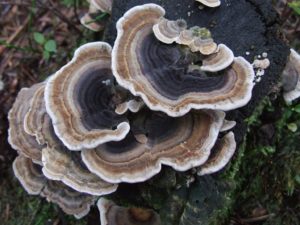Turkey Tail: Named for the colorful fall-like palette of stripes it adorns that favor the plume of feathers on turkeys, turkey tail mushrooms have been brewed for thousands of years by the Chinese as medicinal teas, so it’s no secret to them just how amazing this beautiful mushroom is.
Uses
-
Turkey tail has antioxidant activity, boosts immune response, and is considered an adjunctive treatment in cancer chemotherapy. Several clinical trials have supported these uses.
Benefits
- Prevents and Treats the Common Cold and Flu: The turkey tail mushroom has long been known to stave off any infection, including those associated with the common cold or flu. It helps your immune system become more resilient to ill-causing germs. When flu season approaches, you may want to include turkey tail as a supplement in your dietary routine. The turkey tail mushroom has been shown to modulate the immune system, helping fight infections, illness and diseases.
- Can Offer Support to Chemo Patients: Turkey tail mushrooms may help cancer patients who are going through chemotherapy. The U.S. Food and Drug Administration (FDA) has conducted clinical trials for a turkey tail extract to be consumed by patients who have advanced prostate cancer and are enduring conventional chemotherapy as well as testing how well it helps women with breast cancer in combination with a vaccine treatment in hopes of a new and better form of cancer therapy.
- May Combat Breast Cancer: A study published in Global Advances in Health and Medicine revealed that an 83-year-old woman who was diagnosed with advanced, metastatic inflammatory breast cancer led a disease-free life after using turkey tail mushroom. Though she continued chemotherapy use, she consumed capsules of turkey tail mushroom at the same time.
- Scientists believe that the immune response of the turkey tail mushrooms boosted the woman’s immune system by recognizing the tumor, which increased the effectiveness of the chemotherapy. This is consistent with research that claims medicinal disease-fighting mushrooms like turkey tail, as well as maitake, reishi and Agaricus blazei, can be natural immune-enhancing and anticancer treatments.
- Helps Treat Human Papilloma Virus: Mushrooms, in particular the turkey tail mushroom, may help heal infections, such as the human papillomavirus (HPV). According to a study of 61 patients with gum disease testing positive for HPV, 88 percent of the 41 patients who received both turkey tail and reishi mushrooms showed positive results after only two months of treatment.
- Aids in Digestion: The mycelium in the mushroom is what may help you have a smoother digestion process when supplementing with turkey tail mushrooms. The mushroom contains perfect prebiotics that assist the microbiome. This means that it can help the growth of the good bacteria in the body, including acidophilus and bifidobacterium, which is even more beneficial for anyone suffering from leaky gut syndrome. And this better digestion could even help you lose weight.
- May Help Patients with HIV/AIDS: Studies reveal that the use of turkey tail mushroom, in conjunction with other wild medicinal East African mushrooms, may be useful in treating patients with Kaposi’s sarcoma, a skin cancer often affecting those with HIV/AIDS. The same product has also benefited patients with HIV/AIDS even without the sarcoma.
Cautions
- It’s always best to check with your doctor prior to using any new food for medicinal purposes, especially if you’re pregnant or breast-feeding, or have any disease-related condition. Some patients have reported problems with bowels, such as diarrhea and darkened stools, as well as darkened nail pigmentation.
- If you notice any negative effects or discomfort while consuming turkey tail mushroom, discontinue use immediately and check with your doctor
Interactions
Unknown, please consult with your doctor.
Other names
Trametes Versicolor, Cloud mushroom , PSK , PSP , yun zhi , polysaccharide krestin
References
Source: DrAxe, https://draxe.com/turkey-tail-mushroom/
Drugs.com, https://www.drugs.com/npp/turkey-tail.html
Wikipedia, https://en.wikipedia.org/wiki/Trametes_versicolor
Image source: By Jerzy Opioła – Own work, CC BY-SA 3.0, https://commons.wikimedia.org/w/index.php?curid=25175312

